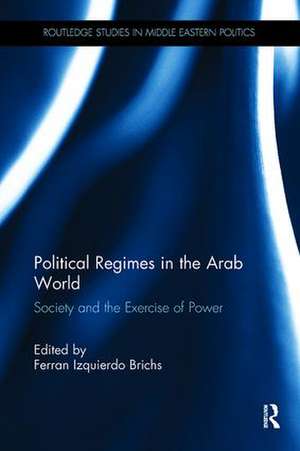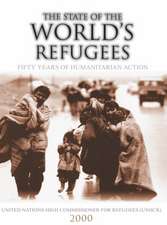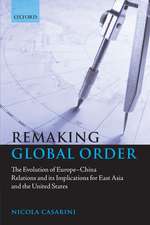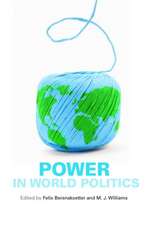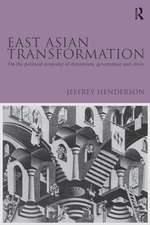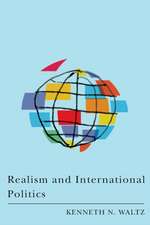Political Regimes in the Arab World: Society and the Exercise of Power: Routledge Studies in Middle Eastern Politics
Editat de Ferran Izquierdo Brichsen Limba Engleză Paperback – 16 iun 2017
The methodological approach of this book, using different countries within the Arab world as models, offers the reader an analysis of relations between the elites and their opposition in a variety of settings. A definition of the political structure of each country is drawn from this analysis before potential future scenarios, as according to country specific experts, are proposed. This model provides a useful contribution to students and scholars of political science and international relations.
Through providing a comparative study of the political regimes currently operating in the Arab world; their elites, civil society, power resources and political resistance, this book illustrates that despite the image of homogeneity sometimes portrayed by the Arab world, it is the multiplicity of models and heterogeneity of regimes that constitute reality.
| Toate formatele și edițiile | Preț | Express |
|---|---|---|
| Paperback (1) | 416.22 lei 6-8 săpt. | |
| Taylor & Francis – 16 iun 2017 | 416.22 lei 6-8 săpt. | |
| Hardback (1) | 1061.06 lei 6-8 săpt. | |
| Taylor & Francis – 3 sep 2012 | 1061.06 lei 6-8 săpt. |
Din seria Routledge Studies in Middle Eastern Politics
-
 Preț: 311.41 lei
Preț: 311.41 lei -
 Preț: 280.08 lei
Preț: 280.08 lei -
 Preț: 309.89 lei
Preț: 309.89 lei -
 Preț: 302.13 lei
Preț: 302.13 lei - 9%
 Preț: 1004.93 lei
Preț: 1004.93 lei - 18%
 Preț: 1065.06 lei
Preț: 1065.06 lei - 18%
 Preț: 1170.14 lei
Preț: 1170.14 lei - 12%
 Preț: 300.49 lei
Preț: 300.49 lei - 18%
 Preț: 1057.57 lei
Preț: 1057.57 lei - 14%
 Preț: 299.06 lei
Preț: 299.06 lei - 18%
 Preț: 1162.08 lei
Preț: 1162.08 lei - 28%
 Preț: 850.37 lei
Preț: 850.37 lei - 18%
 Preț: 1066.09 lei
Preț: 1066.09 lei - 18%
 Preț: 1057.05 lei
Preț: 1057.05 lei - 18%
 Preț: 1059.48 lei
Preț: 1059.48 lei - 18%
 Preț: 1166.49 lei
Preț: 1166.49 lei - 18%
 Preț: 1062.31 lei
Preț: 1062.31 lei - 25%
 Preț: 854.33 lei
Preț: 854.33 lei -
 Preț: 418.22 lei
Preț: 418.22 lei -
 Preț: 341.20 lei
Preț: 341.20 lei -
 Preț: 409.69 lei
Preț: 409.69 lei - 18%
 Preț: 1061.06 lei
Preț: 1061.06 lei - 18%
 Preț: 1056.00 lei
Preț: 1056.00 lei -
 Preț: 287.99 lei
Preț: 287.99 lei - 18%
 Preț: 1057.57 lei
Preț: 1057.57 lei - 18%
 Preț: 1001.87 lei
Preț: 1001.87 lei - 18%
 Preț: 1055.84 lei
Preț: 1055.84 lei - 18%
 Preț: 1052.38 lei
Preț: 1052.38 lei - 18%
 Preț: 1057.89 lei
Preț: 1057.89 lei - 26%
 Preț: 822.36 lei
Preț: 822.36 lei - 18%
 Preț: 1057.26 lei
Preț: 1057.26 lei - 18%
 Preț: 1439.85 lei
Preț: 1439.85 lei - 18%
 Preț: 1164.92 lei
Preț: 1164.92 lei - 18%
 Preț: 1057.75 lei
Preț: 1057.75 lei - 26%
 Preț: 821.29 lei
Preț: 821.29 lei - 18%
 Preț: 1058.79 lei
Preț: 1058.79 lei - 18%
 Preț: 1057.75 lei
Preț: 1057.75 lei - 18%
 Preț: 1056.32 lei
Preț: 1056.32 lei - 18%
 Preț: 1055.69 lei
Preț: 1055.69 lei - 25%
 Preț: 824.70 lei
Preț: 824.70 lei - 18%
 Preț: 1060.25 lei
Preț: 1060.25 lei - 18%
 Preț: 1060.87 lei
Preț: 1060.87 lei - 18%
 Preț: 1071.30 lei
Preț: 1071.30 lei - 26%
 Preț: 820.03 lei
Preț: 820.03 lei - 18%
 Preț: 1056.35 lei
Preț: 1056.35 lei - 18%
 Preț: 1061.22 lei
Preț: 1061.22 lei
Preț: 416.22 lei
Nou
Puncte Express: 624
Preț estimativ în valută:
79.64€ • 83.15$ • 65.92£
79.64€ • 83.15$ • 65.92£
Carte tipărită la comandă
Livrare economică 05-19 aprilie
Preluare comenzi: 021 569.72.76
Specificații
ISBN-13: 9781138109193
ISBN-10: 1138109193
Pagini: 336
Dimensiuni: 156 x 234 x 18 mm
Greutate: 0.45 kg
Ediția:1
Editura: Taylor & Francis
Colecția Routledge
Seria Routledge Studies in Middle Eastern Politics
Locul publicării:Oxford, United Kingdom
ISBN-10: 1138109193
Pagini: 336
Dimensiuni: 156 x 234 x 18 mm
Greutate: 0.45 kg
Ediția:1
Editura: Taylor & Francis
Colecția Routledge
Seria Routledge Studies in Middle Eastern Politics
Locul publicării:Oxford, United Kingdom
Public țintă
Postgraduate and UndergraduateCuprins
Introduction 1 Sociology of Power in Today’s Arab World 2 Algeria: Post-Colonial Power Structure and reproduction of Elites Without Renewal 3 Algeria:Whither Algeria? Two Normalizations, Three Unresolved Crises and Two Crucial Unknowns 4 Morocco: The Reinvention of an Authoritarian System 5 Morocco: Regime and Fuses 6¿E Pur Si Muove? Logics of Power and the Process of Transition in the Islamic Republic of Mauritania 7 Mauritania’s Challenges 8 Contemporary Egypt: between Reform and Continuity 9 Egypt: from Yesterday to the Present 10 Saudi Arabia: Family, Religion, Army and Oil 11 The Futures of Saudi Arabia 12 The Syrian Ruling Elite and the Failure of the Repressive Trend 13 What does the Future Hold? 14 Elites, Power and Political Change in post-war Lebanon15 Lebanon: Temporary or Lasting Peace? 16 Jordan:the Survival of the Monarchy 17 Jordan: a delicate domestic and regional equilibrium
Notă biografică
Ferran Izquierdo Brichs is Lecturer in International Relations, Universitat Autonoma de Barcelona
Descriere
One of the implications of Orientalism is that the Arab world, as a homogenous entity, is often analysed as an anomaly within the international system. This book argues that, despite their differences, societies across the globe ultimately construct their own history according to very similar dynamics and tensions.
The methodological approach of this book, using different countries within the Arab world as models, offers the reader an analysis of relations between the elites and their opposition in a variety of settings. A definition of the political structure of each country is drawn from this analysis before potential future scenarios, as according to country specific experts, are proposed. This model provides a useful contribution to students and scholars of political science and international relations.
Through providing a comparative study of the political regimes currently operating in the Arab world; their elites, civil society, power resources and political resistance, this book illustrates that despite the image of homogeneity sometimes portrayed by the Arab world, it is the multiplicity of models and heterogeneity of regimes that constitute reality.
The methodological approach of this book, using different countries within the Arab world as models, offers the reader an analysis of relations between the elites and their opposition in a variety of settings. A definition of the political structure of each country is drawn from this analysis before potential future scenarios, as according to country specific experts, are proposed. This model provides a useful contribution to students and scholars of political science and international relations.
Through providing a comparative study of the political regimes currently operating in the Arab world; their elites, civil society, power resources and political resistance, this book illustrates that despite the image of homogeneity sometimes portrayed by the Arab world, it is the multiplicity of models and heterogeneity of regimes that constitute reality.
